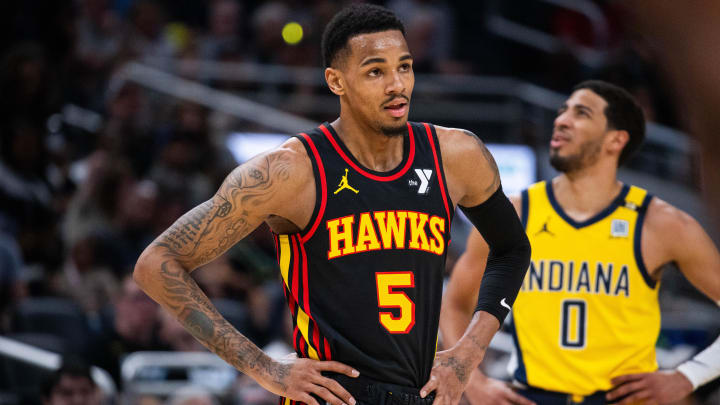
After trading Dejounte Murray to the Atlanta Hawks, what comes next?
Although Dejounte Murray and the Hawks have parted ways, supporters are growing unhappy with the team after the team did nothing in free agency for six days.
Following their June 28 trade of Dejounte Murray to the New Orleans Pelicans, the Atlanta Hawks have remained silent on the radio. Following an unsuccessful attempt to combine him with Trae Young, general manager Landry Fields determined that Dyson Daniels and Larry Nance Jr. would complement Young’s style more effectively. At age 21, Daniels is a superb defender who will be a useful rotational player in the backcourt with Kobe Bufkin.
While on the Pelicans, Nance predominantly played power forward, and with Hawks head coach Quin Snyder, he’ll probably continue to do so.
For the Hawks, this coordinated attempt to strengthen the defense is encouraging.
The team’s spacing has improved as a result of Murray’s move. Still, it begs the question, what comes next? In addition to Young, the Hawks need to locate another shot-maker to take Murray’s spot. With recent moves in the league, including Paul George’s max deal with the Philadelphia 76ers and Klay Thompson’s departure from the Golden State Warriors, free agency is well underway. This puts further pressure on Fields and the front office to act.
They have to be better this off-season, and with Young perhaps asking for a trade following yet another disappointing season in Atlanta, the stakes are very high. With one year remaining on his $158 million, five-year deal with New Orleans, and no offer from Pelicans general manager David Griffin to extend, Brandon Ingram is a genuine possibility.

Jimmy Butler and the Miami Heat are still in negotiations. There has been no update on the issue as of July 4.
The Hawks’ issue stems from Tony Ressler, the team’s owner, and the front office’s refusal to pay the luxury tax in order to sign a great player. It makes sense since supporting actors like Vit Krejci and Bruno Fernando still require compensation. Saving as much money as they can in order to approach Young about an extension when the time comes in 2026 is their first objective. Young accounts for 30.61% of the Hawks’ salary cap hit percentage; he will be joined by a star who commands at least as much.
On July 6th, teams may formally sign free agents, and the Hawks have a lot of alternatives.
The front management has to decide if they want to be a lower-seeded club in the Eastern Conference for the third straight year or pay the tax for another elite player.
If Fields and Company are willing to pay the cash, there are still a number of free agents available. Malik Beasley would make a respectable shot-creator at a fair price and is coming off of a fantastic season from beyond the arc (41%). Another young, talented shooting guard, 23-year-old Taylor Horton Tucker, is a free agent without restriction and has the potential to be a key player in the future.
If Ressler does not pay the tax, as many NBA analysts predict, this would be a huge risk. To contend with formidable teams like the recently crowned champion Boston Celtics, New York Knicks, and the enhanced Sixers, this youthful group needs additional development. Ressler’s financial constraints on the team play a significant role in the Hawks’ ongoing criticism for their inaction throughout the off-season.
The Hawks are now worth $3.33 billion after Ressler paid $850 million to purchase the franchise from Bruce Levenson in June 2015. The biggest deal they have paid for in this period was Young’s $207 million five-year agreement in 2021; they haven’t paid for anything about that size since. Due to their refusal to pay the tax, they lost a significant number of players during the Eastern Conference finals run in 2021.
After two dismal seasons, they will go through the same thing in 2024–2025 unless significant changes are done.
According to the NBA’s Collective Bargaining Agreement, your franchise will get extra money if you fail to pay the luxury tax. The front management may decide against going after a great player in favor of financial stability if they see the bonus money as vital for the future. Ressler will, however, pay the luxury tax if they are sincere about winning now, accepting a significant risk in exchange for a potential franchise-altering gain.
Leave a Reply